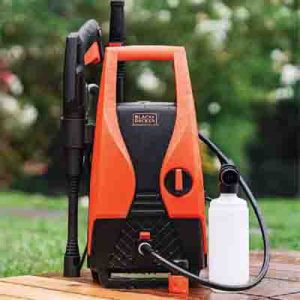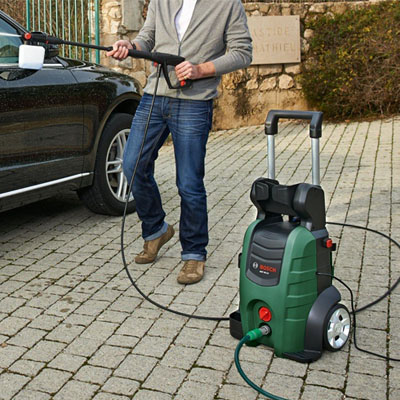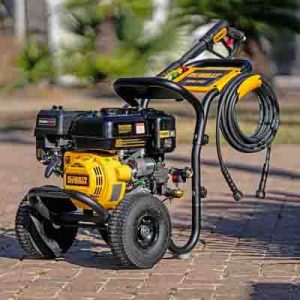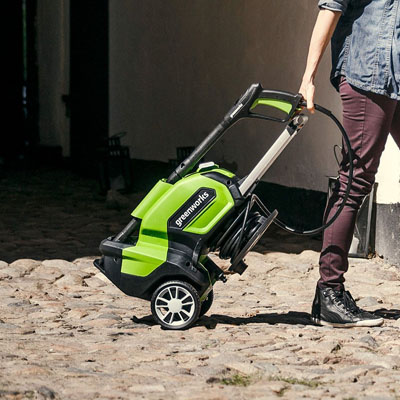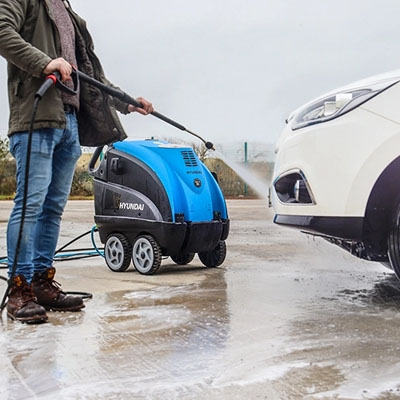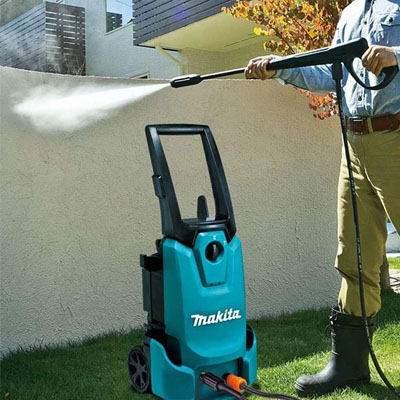The Ultimate Pressure Washer Guide
A pressure washer, or as it's affectionately known in the UK, a power washer, stands as an indispensable and versatile cleaning companion for a multitude of outdoor tasks. At its core, it harnesses the force of high-pressure water to obliterate dirt, grime, and stubborn stains from various surfaces, establishing itself as a must-have tool for both homeowners and professional cleaners alike. The secret to its prowess lies in its ability to unleash a concentrated stream of water at pressures that far exceed those of a humble garden hose. These machines also offer a suite of nozzle attachments that can be tailored to manipulate the spray's width and strength, granting them the versatility to tackle everything from delicate car detailing and window cleaning to the challenging tasks of paint stripping and outdoor space cleansing. When embarking on the journey to procure a pressure washer, it's imperative to begin your quest with thoughtful consideration and a precise understanding of your unique cleaning requirements. Pressure washers come in a diverse range of models, each tailored to distinct tasks and demands. Your first step should involve assessing the scale and frequency of your cleaning undertakings. For those occasional, smaller tasks around the home, an electric pressure washer may prove more than sufficient, offering user-friendly operation, portability, and a less raucous performance. On the contrary, if your aspirations revolve around tackling larger and more frequent assignments, a gas-powered pressure washer could be your weapon of choice, thanks to its elevated PSI output and mobility, although it's essential to note that these machines tend to produce more noise and require more maintenance.Varieties of Pressure Washers
Electric Pressure Washers:
Electric pressure washers find their niche in light to moderate cleaning duties around the household, from washing automobiles to refreshing outdoor furniture and vanquishing mildew from siding. These models are relatively lightweight, easy to maneuver, and offer a quieter operation than their gas-powered counterparts. Moreover, they are more environmentally friendly, as they don't spew out exhaust fumes.Gas-Powered Pressure Washers:
Gas-powered pressure washers are renowned for their potent might and versatility. They tackle heavy-duty cleaning jobs with ease, including paint removal, large driveway cleansing, and commercial applications. These machines offer enhanced mobility as they aren't tethered to an electrical outlet, but be prepared for their cacophonous symphony and heightened maintenance needs.Cold Water Pressure Washers:
Cold water pressure washers reign as the most common breed, suitable for a broad spectrum of tasks. They operate using regular tap water and excel in vanquishing dirt, grime, and surface stains. Both electric and gas-powered versions of cold water pressure washers can be found.Hot Water Pressure Washers:
Hot water pressure washers are tailored to combat the most challenging cleaning adversaries. Heated water is their secret weapon against grease, oil, and stubborn contaminants, making them the darlings of industrial and commercial sectors, such as heavy machinery maintenance, kitchen sanitation, and automotive workshop cleaning. Typically, these pressure washers are gas-powered to ensure superior heating capabilities.Commercial/Industrial Pressure Washers:
This heavyweight class of pressure washers is built to endure continuous use in demanding environments. They boast sturdy components, lofty PSI ratings, and frequently arrive in hot water iterations. You'll find them conquering construction sites, factories, and large-scale cleaning operations.Residential Pressure Washers:
Designed with homeowners and DIY enthusiasts in mind, residential pressure washers come in various sizes and power ratings, catering to diverse cleaning needs around the household. These machines are typically compact, easy to store, and exceedingly user-friendly.Light-Duty and Medium-Duty Pressure Washers:
Light-duty pressure washers are tailored for occasional use on minor tasks such as vehicle cleaning and patio furniture sprucing. Their medium-duty counterparts offer a bit more brawn and versatility, rendering them perfect for broader cleaning projects, including deck rejuvenation, fence cleanup, and home exterior facelifts.Heavy-Duty Pressure Washers:
Unleash the heavy-duty pressure washers for frequent and demanding cleaning endeavors. These warriors often bear high PSI ratings and robust construction, making them a staple for commercial and industrial tasks.Trailer-Mounted Pressure Washers:
Mounted on trailers for ease of transport to various job sites, these pressure washers are the preferred choice of professional cleaning services and contractors, offering the magical blend of mobility and raw power.Pressure Washer Features
- High-Pressure Output: Pressure washers produce a formidable stream of water at different pressure levels, usually measured in PSI (pounds per square inch). This high-pressure output is their primary feature, delivering unparalleled cleaning prowess in the battle against dirt and grime.
- Water Flow Rate (GPM): The water flow rate, measured in gallons per minute (GPM), dictates how much water the pressure washer dispenses. A higher GPM can expedite cleaning tasks by covering a more extensive surface area.
- Adjustable Nozzles: Pressure washers are commonly equipped with interchangeable nozzles, allowing you to fine-tune the spray pattern and pressure. Different nozzles cater to a variety of missions, from gentle rinsing to heavy-duty scrubbing.
- Detergent Tanks: Many pressure washers incorporate built-in detergent tanks or soap applicators, simplifying the application of cleaning solutions and boosting overall cleaning efficacy.
- Wheels and Handles: Portability gets a boost from wheels and ergonomic handles, enabling you to glide the pressure washer with ease, even across uneven terrain.
- Hose Length: A lengthier hose translates to an extended reach, permitting you to clean without incessantly relocating the pressure washer.
- Cord Length (Electric Models): Electric pressure washers may sport elongated power cords for added convenience and versatility.
Perks of Owning a Pressure Washer
- Efficient Cleaning: Pressure washers redefine the cleaning game, offering a faster and more effective alternative to manual scrubbing and garden hose-based methods, which ultimately saves both time and effort.
- Versatility: These machines are adept at addressing an array of surfaces, from driveways, decks, and siding to vehicles and outdoor furniture.
- Water Conservation: Pressure washers prove eco-conscious by utilizing less water compared to traditional cleaning techniques, thanks to their high-pressure spray that delivers greater efficiency in cleaning.
- Enhanced Curb Appeal: Regular use of a pressure washer helps uphold the aesthetic integrity of your residence, driveway, and outdoor spaces by removing dirt, mold, and mildew, thus bestowing a cleaner and more inviting appearance.
- Preparation for Painting: Pressure washing stands as an excellent preparatory step for painting endeavors, as it eradicates old paint and ensures a clean, smooth surface for paint application.
- Eco-Friendly Cleaning: Electric pressure washers wear the badge of environmental friendliness, producing zero exhaust emissions and positioning themselves as a green alternative to their gas-powered peers.
Pressure Washer Safety Guidelines
- Wear Protective Gear: Prioritize safety by donning protective goggles or a face shield to shield your eyes from debris and high-pressure spray. Additionally, ensure you are appropriately dressed, and wear closed-toe footwear.
- Read the Manual: Before unleashing your pressure washer, acquaint yourself with the manufacturer's instructions and recommendations to ensure safe and proper operation.
- Mind the Pressure: Adapting the pressure settings and nozzle type to match the task at hand is crucial. High-pressure settings can harm surfaces or pose injury risks.
- Keep a Safe Distance: Maintain a safe distance between the nozzle and the surface being cleaned to prevent injury or damage to the surface itself.
- Avoid Spray on People or Animals: Never direct the pressure washer spray towards people, pets, or delicate objects to prevent accidents and injuries.
- Use the Right Detergent: Strictly employ detergents specifically designed for pressure washers, steering clear of harsh chemicals that could harm the equipment or the environment.
- Proper Ventilation (Gas Models): If operating a gas-powered pressure washer, make sure to do so in a well-ventilated area to prevent the buildup of carbon monoxide.


